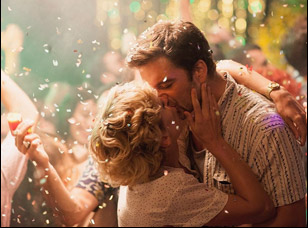It started as an inside joke that Argyris Papadimitropoulos would name the gregarious Grecian who first pushes Mickey (Sebastian Stan) and Chloe (Denise Gough) towards one another in his rollicking fourth feature “Monday” after himself, a fraught proposition once they start taking his name in vain when their relationship gets complicated.
“I throw a party every year, which is exactly the same as the one in the first scene [where they meet],” says Papadimitropoulos. “And then [after] I decided that this fellow was a party-throwing guy and had to have my name, I checked with one of my favorite Greek actors that people sometimes say that we look like brothers to play this part.”
Even if it didn’t have the added benefit of amusing the director to no end that his actors could – and would – call Argyris every name in the book, you’d know that Papadimitropoulos brought his personality to “Monday” in all the best ways, a finely calibrated romance that runs the gamut from a sparkling comedy when Mickey convinces Chloe to spend a few more days in Athens, after the immigration attorney wants to retreat to America following a bad breakup, to a bracing, clear-eyed look at the love it takes to weather the ups and downs of a long-term commitment. Unfolding across a series of weekends in which the two party it up and find new and exciting places to have sex, “Monday” finds the bill often coming due when there’s no doubt about their physical infatuation, but emotionally they may not be ready for what the other brings to the table, with Mickey the father of a six-year-old he longs to see again if his ex would let him and Chloe uncertain of whether she can see a future with him when she’d like to start planting roots.
Papadimitropoulos asks a lot of Stan and Gough, not only throwing them into the raucous nightlife of Greece’s capital city where anything can happen, but to deploy their ample charms to seduce each other — and the audience — and gradually strip one another down to find what they really want from a partner. Both prove to be up to the challenge and then some, with Stan and Gough showing their full range as lovers who are responsible in some parts of their lives and utterly irresponsible in others, finding each other at just the right moment of need, but wondering whether that moment is meant to last. At least as far as “Monday” is concerned, you hope it does and with the film starting to make its way out into the world via the Toronto Film Festival’s Industry Selects sidebar after its planned premiere at the Tribeca Film Festival was cancelled as a result of the coronavirus, Papadimitropoulos graciously took the time to talk about his immersive style of filmmaking where there’s always electricity in the air, extravagant party planning and why it was important to set his English-language debut in his hometown of Athens.
I wanted to make a love story. These friends of mine had a beautiful relationship and then one day, we heard that the whole thing is going to shit. They became very bad versions of themselves who had been lovely until then, so I started exploring why two people that were madly in love at some point can become exhausted. I started talking with friends and I started collecting little stories — something here, something there — and I drew from my own experiences too. Then I met Rob Hayes, and [we] wrote the script together and the idea was we all can have a good time on the weekends, but what happens when reality knocks on the door symbolically and it’s Monday.
How did Denise and Sebastian come to mind to play this couple?
First of all, I saw their previous work and it’s pretty amazing. They looked exactly how I imagined the characters as I was writing the script and then when I met them, it felt like they were super-enthusiastic in [my] method of improvising a lot. They were very keen on spending time before principal photography, which is very important for me, and the chemistry was great. The three of us got together in New York and we had a two-hour meeting that I hoped would last forever. You could feel the energy and that they’re both the right people, so I pretty much fell in love with both of them. Then they came to Greece and we spent three weeks together, working on the script, going out every day, spending time to get to know each other well and then when we started shooting, it didn’t feel like work. The work was done before, so it was just enjoy the shoot.
When it sounds like you give that much leeway between the actors and there’s such sparks between them, is there anything that came out in their work that might’ve surprised you?
We wrote the script, but from the very beginning, I explained to the actors and the producers that the dialogue and the whole story is there, but we don’t have to really use it, so everything has something new, sometimes in terms of dialogue or other times in terms of where it goes or in terms of atmosphere. We would give ourselves space for improvisation and then with Napoleon [Stratogiannakis], my editor, it feels like rewriting the script again [because] all this improvisational material forms another story. It’s kind of risky and at the beginning, it feels intimidating for some actors that you don’t tell them exactly what to say, but all the actors enjoy that at the end. In the beginning, most of the actors are usually told what exactly to do, so that’s the way most of them are used to work, but when they get so much freedom at the end, it’s very liberating. They enjoy that a lot. And I do too.
Those parties in the film looked really wild. Did you have much control over them?
First, I’m experienced in throwing parties. It’s the one thing I love doing and then also I’m very experienced in filming parties because all my films have massive, big parties with real people, my DP [Christos Karamanis] and the crew and I have mastered the idea of filming while the real party is happening, so what we did is we had an amazing group of people organizing the parties for us and inviting their friends. Then we would throw the actual party and then we’d have Denise and Sebastian and the rest of the actors blend in. We would shoot the closeups where you have some dialogue with a few people in the background and no music and then the rest of it, we would shoot in real time while the party was happening with loud music. It’s not that crazy, but it’s a real party and we actually have people who are having a good time rather than pretending to have a good time and us struggling to get the shot.
Was it tough to design a visual language where it was accommodating the extremes of this relationship? You feel the exhilaration in those party scenes, but also the stillness during the more emotionally interior scenes.
Yes, my director of photography and I are very close friends and we have this suggestion of breathing together with the actors, like always on the same pace, on the same rhythm, breathing the same air, so the camera follows them closely. We don’t really rehearse or choreograph the film. We let them be free in the space and we move towards them, so [after] it’s lively and so close to them, when you decide to cut to a static or more stylized shot, it means much more than a film that is always stylized shots. The idea is to film the people like you’re filming a documentary and then when you decide to do a stylized shot, this shot has to have a reason to be there.
Part of what makes the film feel so alive is how much of it you shoot in public spaces. Was it a challenge filming in and around Athens?
Yeah, I like shooting in real spaces and not in studios much more because what I want to do with my films is I want them to look as truthful as possible. Especially with a story like this, if it looks fake, then it will somehow stink. So I decided to shoot my first English-language film in a place I know very well with people I know very well — in Athens where I was born and raised and in locations that are very important for me. I believe it’s super photogenic even though it’s chaotic, so in the film, it’s a character itself, and for the supporting parts, I worked with some amazing Greek actors that we’re friends and we worked [together] before, so we were all a very happy group of people doing this. We tried to make everything part of the film and one can say this is a love letter to my hometown.
What’s it like bringing this out into the world now?
In the beginning, when the official premiere was cancelled due to the pandemic, I was very sad that I wouldn’t be able to be together with the people that we spent so much time doing this film [with], to be in the same theater and be able to throw a party and celebrate afterwards. But things were so serious that my problem was not a real problem, so I decided that “Alright, it is what it is and I’m going to wait until something [changes] and the virus slows down. Something cool is going to happen.” Now TIFF happens, which again, is not the physical [event it usually is], but I hope really soon people are going to be able to watch it in a big theater or in another way. For me, the idea is for lots of people to watch the film and talk about their own relationships.
“Monday” is now screening virtually as part of the Toronto Film Festival’s Industry Selects sidebar.





